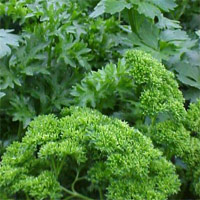Parsley

Parsley deserves recognition for more than its role as a garnish or in the occasional parsley potatoes: It is rich in iron and vitamins A and C and is a good breath freshener.
About This Plant
Curly leaf parsley is the most common type because it makes such an attractive garnish. For cooking and chopping, the flat-leaved parsley is preferable; it's easier to work with and has a better flavor.
Site Selection
Plants do well in sun or partial shade, and prefer a rich, moist soil.
Planting Instructions
Sow in individual pots indoors or start outside in the garden. Choose as weed-free an area is possible for garden sowing -- the seeds are slow to germinate, and you don't want a jungle to develop while you're waiting. The crop can handle cold weather, so start seeding 2 to 3 weeks before the last spring frost. Thin plants to stand 6 to 10 inches apart.
Care
Provide an even supply of water all summer.
Harvesting
To harvest, cut entire leaves from the outer portion of the plant as you need them. To keep fresh parsley for as long as possible, store it in the refrigerator with the leaf stalks in water. To dry parsley, cut the plant at soil level and hang it in a shady, warm, well-ventilated area. Once thoroughly dried, crumble the parsley and store it in an airtight container. A few plants can be dug up, set in large pots with extra soil, and brought indoors to a sunny window for light winter harvests.






 Parsley deserves recognition for more than its role as a garnish or in the occasional parsley potatoes: It is rich in iron and vitamins A and C and is a good breath freshener.
Parsley deserves recognition for more than its role as a garnish or in the occasional parsley potatoes: It is rich in iron and vitamins A and C and is a good breath freshener.